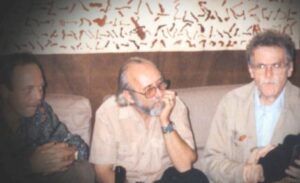Here, on Pierre Joris’s blog, is my tribute to Jerome Rothenberg for his 80th birthday:
Unable to be present in person for the celebratory gathering for Jerome Rothenberg @ 80 at the Graduate Center last Friday, Robert Kelly sent the following homage, which I read as part of the introduction to Jerome Rothenberg’s reading (the other part being David Antin’s homage, read by Charles Bernstein & published here).
“I wish I could be there now to thank and praise and celebrate—bless you all for doing it for me. But my sins (that is, the body) have caught up with me for a season, and I remain rustic. My mind though wanders in such an immense garden of gratitudes to Jerry, and to Diane, for what they’ve done for me and what they’ve done for American poetry. Jerry’s Hawks Well Press published my first book, and in that sense gave me my start—but more important, they gave so many of us a place to start from: the nurturing network spreading out from their amazing apartment way up north off Broadway, a powerhouse of aesthetic scheming, revolutionary anthropology, subversive art history—all the conditions of a community from which art can come. I don’t know how I could have thrived without them. Or how we could have thrived: back in that time, the 1950s, American poetry was showing signs of life, after all the dozing between confessional and professional, the couch and the classroom. Rothenberg, through his linguistic gifts, through cooperation (so many years!) with Diane’s energetic ethnology, through his own genius, was the great rouser in those days, catching revived surrealism but adding to it the excitement of the profound Otherness of space and time, the so-called Primitive, the tribal, the magical, the oral. For us, he played (and plays) the role Picasso and Braque did for the painters, and Leiris and Bataille later for the French poets: opening the sparkling world that comes when you crack open literature and see the primal gestures of oral energy and sudden imagery from which it all surges. Kabbalah, cave painting, Iroquois legend, Navajo chant, Hasidic tales, Central Asian epic, German avant-garde, immigrant histories—he summoned us to attend to the deep literature of which the ‘literary’ is only a sheen. He didn’t get caught in formalisms, credences, opportunism. He taught me a dislike of slogans, and almost succeeded in teaching me modesty and the Taoist wisdom of hsiao, being small. He is a great figure, who stands above and beyond the schools and tendentiousnesses of poetics; he has given us, in his poetry, criticism, translation, anthologies, a body of work that exhibits what I suddenly realize is an ethical purity, a touchstone for the genuine.”
RK, 8 December 2011

Recent Comments